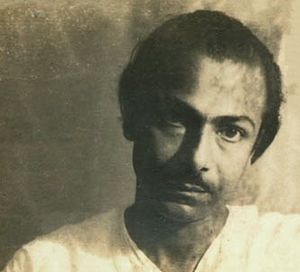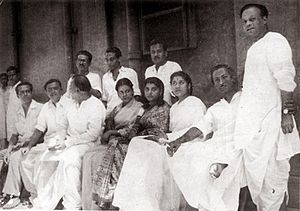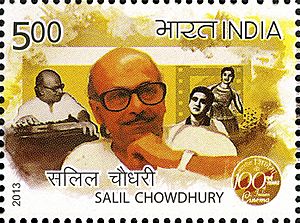Salil Chowdhury facts for kids
Quick facts for kids
Salil Chowdhury
|
|
|---|---|
 |
|
| Background information | |
| Born | 19 November 1925 Ghazipur, 24 Parganas, Bengal Presidency, British India (present-day South 24 Parganas, West Bengal, India) |
| Died | 5 September 1995 (aged 71) Calcutta, West Bengal, India |
| Genres | Bengali, folk, film base, western classical fusion, Indian classical fusion |
| Occupation(s) | Singer-Songwriter, Composer, Arranger, Poet, Lyricist, Story-writer |
Salil Chowdhury (born November 19, 1925 – died September 5, 1995) was an Indian music director, songwriter, lyricist, writer and poet. He mainly created music for Bengali, Hindi, and Malayalam movies. He composed music for films in 13 different languages. This includes over 75 Hindi films, 41 Bengali films, and 27 Malayalam films. He also worked on some Marathi, Tamil, Telugu, Kannada, Gujarati, Odia, and Assamese films.
People in the Indian film industry greatly respected his musical talent. He was a skilled composer and arranger. He could play many instruments well, like the flute, the piano, and the esraj. He was also known for his inspiring and original Bengali poetry. His fans lovingly called him Salilda.
His first Bengali film as a music composer was Paribortan, released in 1949. Mahabharati, released in 1994, was the last of his 41 Bengali films.
Contents
Salil Chowdhury's Amazing Career
Early Life and Musical Beginnings
Salil Chowdhury was born on November 19, 1925, in Ghazipur, a village in South 24 Parganas, West Bengal. He spent his childhood in the Tea Gardens Region of Assam. His father, Dr. Gyanendra Chowdhury, was a doctor at a tea estate. He used to put on plays with the tea garden workers.
From 1931 to 1951, an Irish doctor named Dr. Maloni was the Chief Medical Officer there. Young Salil listened to Western orchestral music on Dr. Maloni's gramophone. This early exposure to music left a big mark on him.
During World War II, Salil saw a lot of human suffering and hunger. He also saw many refugees. These experiences shaped his ideas. He studied at Harinavi D.V.A.S High School. Later, he went to Bangabasi College in Kolkata. During this time, his political and musical ideas grew stronger.
As a teenager, Salil was already interested in music. He played the flute, harmonium, and esraj. He learned to play the piano from his older brother when he was just 6 years old. In college, he started writing his own tunes. His first popular song was "Becharpoti tomar bichaar" (meaning "the days of new judgment have come because people are now awake"). He wrote this song in 1945. It was during the Indian National Army trials, when freedom fighters returned from Andaman jail.
In 1943, Salil moved to a village in 24 Parganas to live with his uncles. There, he saw a big peasant uprising. He joined them and started writing songs for the peasant movement. In 1944, while studying in Calcutta, he saw many people dying on the streets during the Great Bengal Famine of 1943. This famine was caused by food shortages. This made Salil fully join the peasant movement. He became a full-time member of IPTA and the Communist Party.
Because of his political work, arrest warrants were issued for him. He went into hiding in the Sundarbans, supported by local farmers. During this time, he kept writing plays and songs.
In 1944, Salil came to Calcutta for his college studies. He joined the IPTA (Indian Peoples Theater Association). This was a cultural group linked to the Communist Party of India. He started writing songs and creating music for them. The IPTA group traveled to villages and cities. They shared these songs with common people. Songs like Bicharpati, Runner, and Abak prithibi became very popular.
Songs like Gnaayer bodhu (গাঁয়ের বধূ), which he composed at the age of 20, brought a new style to Bengali music. Almost every famous singer from West Bengal sang at least one of his songs. Some of these singers were Debabrata Biswas, Manna Dey, Hemanta Mukherjee, Shyamal Mitra, and Sandhya Mukherjee.
Journey in Film Music
Salil Chowdhury's first Bengali film as a music composer was Paribortan (1949). His last Bengali film was Mahabharati (1994).
In 1953, Salil Chowdhury came to Bombay. He was writing a story for a Bengali film. It was about a farmer who lost his land and became a rickshaw puller in Calcutta. Hrishikesh Mukherjee heard the story and loved it. He suggested Salil tell it to director Bimal Roy. Roy liked the story and wanted to make it into a movie.
This led to Salil Chowdhury's first Hindi film, Do Bigha Zamin (1953). He was the music director. The movie was based on a poem by Tagore, but Salil wrote the story himself. Directed by Bimal Roy, this film became very successful. It was the first film to win the Filmfare Best Movie Award. It also won an international prize at the Cannes Film Festival.
After working in Bengali and Hindi films for about 20 years, he started working in the Malayalam film industry. In 1964, he composed music for the movie Chemmeen. He went on to compose music for films in 13 languages.
When asked about how he composed music, Chowdhury explained his method. He would ask the filmmaker to describe the scene or situation. Then, he would create a tune that fit the mood. After that, the lyric writer would add words to his tune. He used this method for most of his films, including Madhumati.
During the Bangladesh Liberation War in 1971, Chowdhury helped with programs for Swadhin Bangla Betar Kendra. This was a radio station based in Kolkata. His 1971 album Bangla Amar Bangla was made to support the fight for freedom. Later, when he visited Bangladesh in 1990, he received a hero's welcome in Dhaka. In 2012, he was given the Muktijoddha Maitreye Samman award after his death.
Salil Chowdhury was also a poet, playwright, and short story writer. He even directed a film called Pinjre Ke Panchhi in 1966. It starred Meena Kumari, Balraj Sahani, and Mehmood. The film was based on his own story and screenplay.
In 1958, Salil Chowdhury started the Bombay Youth Choir. This was the first secular (non-religious) choir in India. He was its composer and conductor. He inspired many other secular choir groups to form across India. He created a new type of music using different voices for Indian folk and modern music.
Salil Chowdhury's Family Life
Salil Chowdhury married Jyoti Chowdhury, a painter, in July 1952. They had three daughters: Aloka, Tulika, and Lipika. Later, he married singer Sabita Banerjee. With Sabita, he had two sons, Sukanta and Sanjoy, and two daughters, Antara and Sanchari. His son, Sanjoy Chowdhury, is also a successful music composer. His daughter, Antara Chowdhury, is a well-known singer. Sabita Chowdhury passed away on June 29, 2017.
Salil Chowdhury's Lasting Legacy
Salil's music was a mix of Eastern and Western music styles. He once said, "I want to create a style which shall go beyond borders. A style that is strong and polished, but never easy to guess." He tried many different things. He wanted to be great at everything he did. But sometimes, he felt a bit unsure. He once told a journalist, "I don't know what to choose: poetry, story writing, music for orchestras, or composing for films. I just try to be creative with what fits the moment and my mood."
Salil's love for Western classical music began when he was a young boy. He grew up in an Assam tea garden where his father worked as a doctor. His father got many Western classical records and a gramophone from an Irish doctor. Salil listened to music by Mozart, Beethoven, Tchaikovsky, and Chopin every day. At the same time, he was surrounded by the sounds of the forest, birds, flutes, and local folk music of Assam. This had a deep impact on young Salil. He taught himself to play the flute, and Mozart was his favorite composer.
His songs often used folk tunes or Indian classical ragas. But the way he arranged the music was very Western. His daughter Antara said that Salil once joked that he was Mozart, reborn!
Salil was a great composer. He even recognized the talent of a guitarist in his orchestra. He said, "I think he's going to be the best composer in India." That guitarist later became Maestro Ilaiyaraaja. A. R. Rahman's father, R. K. Shekhar, used to conduct Salil Chowdhury's music arrangements in South Indian films. Rahman once said that Salil Chowdhury's music greatly influenced his own understanding of music.
"The Salil Chowdhury Foundation of Music, Social Help & Education Trust" was started in 2002. His wife, Sabita Chowdhury, and daughter, Antara Chowdhury, created it. Their goal is to continue his work and keep his music alive. In 2015, the Salil Chowdhury Memorial Concert and Honours were created. These events honor great Indian singers and musicians in his memory.
Filmography Highlights
Salil Chowdhury composed music for films in many languages. Here are some of his notable works:
Hindi Films
| Year | Film |
|---|---|
| 1953 | Do Bigha Zamin |
| 1954 | Naukri |
| 1956 | Jaagte Raho |
| 1958 | Madhumati |
| 1960 | Parakh |
| 1961 | Kaabuliwaalaa |
| 1962 | Half Ticket |
| 1966 | Pinjre Ki Panchhi |
| 1970 | Aanand |
| 1974 | Rajnigandhaa |
| 1975 | Chhoti si Baat |
| 1979 | Kalaa Patthar |
Bengali Films
| Year | Film |
|---|---|
| 1949 | Poribartan |
| 1952 | Paasher Baadi |
| 1956 | Raat Bhore |
| 1959 | Baadi Thekey Paaliye |
| 1960 | Gangaa |
| 1961 | Komol Gandhaar |
| 1972 | Marjina Aabdullah |
| 1980 | Akaler Sandhaney |
| 1994 | Mahabharoti |
Malayalam Films
| Year | Film |
| 1965 | Chemmeen |
| 1968 | Ezhuraathrikal |
| 1973 | Swapnam |
| 1974 | Nellu |
| 1975 | Raagam |
| 1976 | Thulavarsham |
| 1977 | Vishukkanni |
| 1978 | Madanolsavam |
| 1980 | Air Hostess |
Other Language Films
| Language | Year | Film |
|---|---|---|
| Tamil | 1971 | Uyir (background music) |
| Telugu | 1974 | Chairman Chalamayya |
| Kannada | 1971 | Samsayaphala |
| Gujarati | 1978 | Ghar Sansaar |
| Assamese | 1970 | Aparajeyo |
| Odia | 1981 | Batasi Jhada |
| Marathi | 1962 | Sunbai |
Famous Songs by Salil Chowdhury
Here are some well-known songs for which Salil Chowdhury composed music or wrote lyrics:
| Year | Song | Singer | Language | Film/Album | Lyrics | Music |
|---|---|---|---|---|---|---|
| 1958 | Aaja Re Pardesi | Lata Mangeshkar | Hindi | Madhumati | Shailendra | Salil Chowdhury |
| 1953 | Aaja tu aa | Lata Mangeshkar | Hindi | Do Bigha Zameen | Shailendra | Salil Chowdhury |
| 1961 | Ay mere pyaare watan | Manna Dey | Hindi | Kaabuliwaalaa | Prem Dhawan, Gulzaar | Salil Chowdhury |
| 1947 | Bichaarpoti tomaar bichaar korbey jaaraa | Chorus | Bangla | IPTA | Salil Chowdhury | Salil Chowdhury |
| 1958 | Chadh Gayo Papi Bichhua | Lata Mangeshkar & Manna Dey | Hindi | Madhumati | Shailendra | Salil Chowdhury |
| 1953 | Bhaai re.. Dharti kahe pukar ke | Lata Manna Chorus | Hindi | Do Bigha Zameen | Shailendra | Salil Chowdhury |
| 1961 | Itnaa na mujhse tu pyaar baDhaa | Lata Mangeshkar, Talat Mahmood | Hindi | Chhayaa | Rajinder Krishan | Salil Chowdhury |
| 1959 | Jaa re ure jare pakhi | Lata Mangeshkar | Bangla | Puja Album | Salil Chowdhury | Salil Chowdhury |
| 1958 | Jungle Mein Mor Naacha | Md Rafi | Hindi | Madhumati | Shailendra | Salil Chowdhury |
| 1995 | Kaathil Thenmazhayaay | K.J Yesudas | Malayalam | Thumboli Kadappuram | O.N.V Kurupp | Salil Chowdhury |
| 1960 | O sajna barkha bahar ayi | Lata Mangeshkar | Hindi | Parakh | Shailendra | Salil Chowdhury |
| 1958 | Suhana Safar Aur Yeh Mausam | Mukesh | Hindi | Madhumati | Shailendra | Salil Chowdhury |
IPTA: Indian People's Theater Association
Awards and Recognitions
Salil Chowdhury received many awards for his amazing work:
- 1953 – Do Bigha Zamin
- Won the Filmfare Best Movie Award and Filmfare Best Director Award (for Bimal Roy).
- Won the All India Certificate of Merit for Best Feature Film.
- Won the Prix International (International Prize) at the 7th Cannes Film Festival. It was also nominated for the Grand Prize (Best Film).
- Won the Prize for Social Progress at the Karlovy Vary International Film Festival.
- 1965 – Chemmeen
- Received the President's gold medal in 1965.
- 1958 – Madhumati
- Salil Chowdhury won the Filmfare Best Music Director Award. The film also won eight other Filmfare awards.
- Madhumati won the National Film Award for Best Feature Film in Hindi.
- He received the Uttar Pradesh Film Patrakar Sangh Puraskar in 1966 for his only Hindi film as a director, Pinjre Ke Panchhi.
- He won the Bengal Films Journalist Award in Kolkata in 1973.
- He received the Allauddin Smriti Puraskar from the Government of West Bengal in 1985.
- In 1988, Salil Chowdhury received the prestigious Sangeet Natak Akademi Award.
- He was given the Maharashtra Gaurav Puraskar Award in 1990.
- After his death, he was awarded the Mukti Judhho Maitreyi Samman Award by the Government of Bangladesh in 2012.
Images for kids
See also
 In Spanish: Salil Chowdhury para niños
In Spanish: Salil Chowdhury para niños
 | Frances Mary Albrier |
 | Whitney Young |
 | Muhammad Ali |





